- UCC covers laws of inheritance, marriage
and divorce etc. FAQ explains matter (also HUF), addresses concerns including
northeast, tribes and has suggestions.
Ever since PM Modi spoke about Uniform Civil Code (UCC) (Article 44 of the Constitution reads “The State shall endeavour to secure for the citizens a uniform civil code throughout the territory of India.”) the topic is being discussed.
This FAQ explains subject with respect
to. Hindu/Muslim/Christian/Parsi women and makes suggestions. I have tried to
be as dispassionate as possible. In case missed out any key issue, please mail
me shall try to incorporate here.
At the outset must state that I am a
Chartered Accountant, not a lawyer or a Constitutional Law expert.
Those who argue
against UCC on the premise of minority rights must read the Supreme Court judgment,
in Mudgal vs. Union of India, A. 1995 S.C. 1531 (para 35): “Those who preferred to remain in India after Partition fully knew that the Indian leaders did not believe in the two nation or three nation theory and that in the Indian Republic there was to be only one Nation – the Indian Nation – and no community could claim to remain a separate entity on the basis of religion.”
1. Which laws are covered
by UCC?
The UCC aims to codify a single law in
India and covers marriage, divorce, inheritance, adoption and succession.
It is not concerned with customs and
traditions. However, if any tradition deprives women of respect it needs to be reviewed. I believe that India’s progress is intertwined with the respect accorded to and progress made by her women (do not mean feminism).
2. Were reforms brought
about in Hindu laws earlier?
Hindu laws were reformed and codified in early 1950’s.
A series of Bills were
passed in the form of Hindu Marriage Act, 1955, The Hindu Succession Act,
1956, The Hindu Minority and Guardianship Act, 1956 and the Hindu Adoption and
Maintenance Act, 1956. These were collectively known as the Hindu Code Bill and
included Indic faiths. Source
3. Who all are covered
under the Hindu Code Bill?
The followers of Indic faiths are Hindus,
Buddhist, Jain and Sikhs.
Of these Jains were declared a minority before the 2014 general elections. Sikhs were declared a minority in the early 1990’s after members of the community killed thousands of Hindus during the Khalistan Movement.
4. Why were Indic faiths
clubbed together?
The four faiths originated in Bharat. Hindu,
Buddhist, Jain are part of the nine schools of Indian philosophy. There is no
Sikh school of philosophy. Author Khushwant Singh called Sikhism distilled
Vedanta in the 29/3/1999 issue
of Outlook. Actually, there is no Hindu school
either. The word Hindu came into being post-Muslim invasion. It is classified
as Hindu using current nomenclature.
Read names of 9 schools Hindu, Hindi,
Hindustan
What unites the schools of Indian
Philosophy? Read their
characteristics
Read Indic faiths vs. Abrahamic Faiths – A Primer to know the difference between
Indic and Abrahamic Faiths.
5. Who all currently take
tax benefit of the Hindu United Family (HUF)?
Followers of Indic faiths.
According to a Business
Standard of December 22, 2016 Decoding the business empire of the Badals,
then there existed a Badal HUF and Sukhbir Singh HUF.
If
Sikhs are declared a minority, can they claim tax benefits under HUF?
Read How are
minorities allowed tax benefits under HUF?
Provisions of the UCC need to match with
other laws like the Income-Tax Act, 1961.
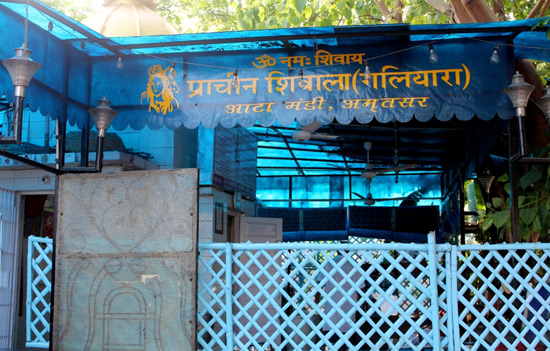 Shiv Mandir in Golden Temple 2012.
Shiv Mandir in Golden Temple 2012.
6. Some Sikhs are worried whether the Anand Marriage Act
will continue?
The Act was passed in 2012 i.e. 62 years
after India became a Republic. It provides for registration of Sikh marriages.
Nothing should change under UCC. For matters referred to in 1, Sikhs will
continue to be covered by provisions of the Hindu Code Bill assuming that UCC
does not change the existing provisions.
SGPC opposes UFC said
this Tribune report. Firstly, the
mandate of SGPC is to look after Gurudwaras of undivided Punjab excluding
Haryana. Over the years, it has tried to become the equivalent of a Sikh
Vatican.
Read Is
SGPC trying to become a Sikh Vatican
7. Will UCC result in
establishment of Hindu Rashtra?
No.
When translated into English Hindu
Rashtra means Hindu Nation. It sounds as if its proponents are suggesting some
monolith, theocratic nation like what exists in Europe and the Middle East. The
concept of nation comes from the Westphalian model of nationhood i.e. a
European construct and is alien to India.
Sandhya Jain wrote
in Dailypioneer, “Indian nationhood rests on the universal
philosophy of Vasudhaiva Kutumbakam (world
is family) and Sarve Bhavantu
Sukhinah, Sarve Santu Niramayah (may all be healthy and happy). The Hindu meaning is that which is applicable or can be adopted voluntarily by all (e.g. Yoga, mutual coexistence etc.). The monotheist concept is that which should be imposed upon all (religion, culture, thinking, et al).”
To read more What is Hindu Rashtra
Hindu laws were reformed and codified in
the 1950s hence the discussion around UCC is focused on Muslims, as if they are
the only non-Hindu residents of India. Read How did UCC
become a Muslim issue Anyway, let us review.
8. What about Muslim Law?
In their wisdom, our leaders did not reform these laws in the 1950’s when Hindu laws were codified.
9. Who introduced Muslim
Personal Law in India?
The British introduced The Muslim Personal
Law (SHARIAT) Application Act, 1937. It is a three page document. This law was
not codified ever.
Political commentator S Gurumurthy
wrote in The New
Indian Express, “Ambedkar challenged them to deny that up to 1935, the North-West Frontier Province followed not the Sharia Law, but the Hindu Law, and up to 1937 in the rest of India, the United Provinces, the Central Provinces and Bombay, Muslims were largely governed by the Hindu Law in matters of succession.” The article gives details of the Common
civil law base of Hindu-Muslim society till October 1937.
Aurangzeb did not pass Sharia Law during
his life time. However, the British passed it 230 years after his death.
Read Who was
responsible for Partition
10. What is Shariyat?
According to Advocate Rajesh Gehani, “Shariyat or Shariah means Law governing Muslims. The provisions are often vague and undefined. Also, it
lacks uniformity across numerous Islamic sects. Primarily the interpretation of
Shariah is based upon the “hukums” and “fatwas” issued by the Maulvis of different sects from time to time.”
11. Is Muslim Personal Law
codified?
No. Thus, the law can be interpreted
differently.
12. Now what does a law being codified mean?
“The things are arranged in a particular or stated manner according to law is known as codification.” 2 The Hindu law has rules and procedures
that need to be followed.
According to Smt Shireen (Principal Junior Civil Judge and Judicial Magistrate of First Class, Sompeta), Muslim Personal Law is unique in the sense that it is not codified. “In order to understand Muslim personal law we
must understand the sources from which it draws its authority. 1 Reference has PDF file of Mrs Shireen
Paper.
“There are much-nuanced differences in the principle and practices of Shia or four schools of Sunni jurisprudence (Hanafi, Maliki, Shafi and Hanbali) and their sub-sects like Wahabi, Ahl-e-Hadith, Deoband and Barelvi and also the cultural pattern of each of these categories do not match with what is stated as Islamic by AIMPLB.” Editorial New Indian Express 2016
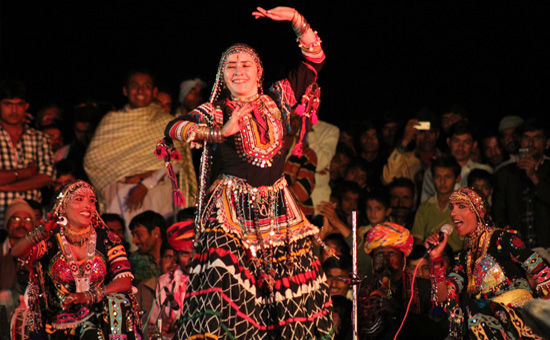 Kalbelia Dance by Hungarian Muslim. Jaisalmer Desert Festival 2013.
Kalbelia Dance by Hungarian Muslim. Jaisalmer Desert Festival 2013.
13. What has the Supreme
Court said on UCC?
In three separate judgements SC has
reiterated the need for UCC. Gauri Kulkarni wrote in Legal Services
India
1. Shah Bano 1985.
“The then Chief Justice of India (CJI) Y.V. Chandrachud (father of present CJI) observed, “A common civil code will help the cause of national integration by
removing disparate loyalties to law which have conflicting ideologies.”
2. Sarla Mudgil 1995.
Justice Kuldip Singh also opined that Article 44 has to be retrieved from the cold storage where it is lying since 1949. He referred to the codification of Hindu Personal Law and held, “Where more then 80 percent of the citizens have already been brought under the codified personal law there is no justification whatsoever to keep in abeyance, any more, the introduction of the 'uniform civil code' for all the citizens in the territory of India.”
3. John V, 2003
The bench comprising of Chief Justice of India V.N. Khare, Justice S.B. Sinha and Justice A.R. Lakshamanan struck down the Section declaring it to be unconstitutional. Chief Justice Khare stated that, “We would like to State that
Article 44 provides that the State shall endeavour to secure for all citizens a
uniform civil code throughout the territory of India It is a matter of great
regrets that Article 44 of the Constitution has not been given effect to.
Parliament is still to step in for framing a common civil code in the country.
A common civil code will help the cause of national integration by removing the
contradictions based on ideologies.””
14. Will UCC infringe on minority rights?
No.
Note that the
word minority is a European concept i.e. not defined in the Indian
Constitution. Actually, UCC shall integrate people and the nation.
Read Rights of
Minorities in India And Waqf
Board passes resolution saying Ahmaddiyas are not Muslims
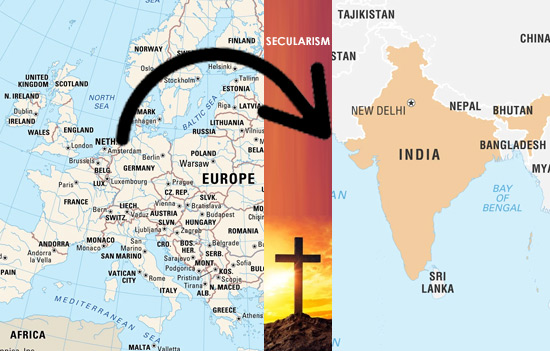
15. Is UCC against
Secularism?
The Constitution does not define the
European word Secularism.
According to this October 2016
article in Firstpost.com a Constitutional Bench of the Supreme Court said, “Secularism does not mean aloofness to religion but giving equal treatment to every religion.”
Equal treatment to all Indians is what
the UCC seeks to do.
Read Meaning of
Secularism And Secularism and
Constitution And Secularism in India – Judicial and Constitutional perspective
16. Will Muslims lose
their identity if UCC is introduced?
No.
They will continue to practice their
religion and wear clothes of their choice. No freedom is absolute. Nation comes
first.
UCC will give Muslim communities namely
the Pasmandas, Ajlafs and Arzaals a seat on the table esp. the Pasmandas.
If
Sharia is to be followed by Indian Muslims, it must be followed in Criminal
Matters too.
17. The All India Muslim
Law Board (AIMLB) is opposing the UCC?
The board was founded in 1972.
It is a private body whose formation might have had tacit support by Mrs Gandhi’s government. Arshia Malik wrote in Swarajyamag.com that the AIMLB was “a disingenuous move by chauvinist male scholars opposing the introduction of the Adoption Bill in Indian Parliament.” Read Secular, it’s a laugh
Amana Begum
wrote in ThePrint, “According to the AIMPLB website, the organisation is a unified platform representing all Muslims, established to safeguard Sharia laws and foster unity within the Muslim community.
However, upon closer examination, it becomes apparent that the body is
primarily a personal endeavour of scholars, religious leaders, and seminary
instructors. AIMPLB also exhibits
casteist and classist characteristic, as majority of its members come from the Ashraaf castes and upper socio-economic backgrounds. They often fail to understand or acknowledge the realities faced by ordinary Muslims, particularly those belonging to the Pasmanda community. As an NGO, their influence and power diminishes if a UCC is implemented, as it would establish a legal framework that does not require religious interference.”
Read Yoginer Sikand
2009 article on AIMLB
AIMLB is a Sunni Muslim dominated
private body. The Shias have an All India Muslim Shia Law Board that was
founded in 2005. Aditi Narayani wrote in ThePrint, “Considering that most Muslim bodies are run by Ashrafs, it is not surprising that the major opposition to the UCC is coming from them and non-indigenous Muslims.”

18. What about laws
governing Indian Christian women?
Dr Sebastian Paul, a lawyer practicing in the High Court of Kerala wrote, “Indian Christians are governed by the Indian Succession Act of 1925 in matters of intestate and testamentary succession. Section 3 of the Indian Succession Act gives power to a State Government to exempt any race, sect or tribe from the operation of the Act (note most northeast tribes are Christians). Native Christians in the Province of Coorg is one such exempted category. There is no codified Christian law based on the Bible or any other religious book. Canon is a Church decree or law which has no role in deciding the inheritance of ancestral or paternal property by Christian women. There is no law in force which disqualifies a Christian daughter to inherit her parents on the ground that she was paid streedhana at the time of her marriage.”
To read full article on esamskriti ‘Inheritance Law for Christian Women in India’
19. What about Parsi
women?
According to Economic Times article, “A Parsi widow is entitled to get an equal share as her children besides the deceased's parents who get half of the child's share, in her husband's estate. And in the absence of the parents, the property is distributed between the Parsi woman and her children, so that the widow and each child receive equal shares in the estate of the deceased.”
For discrimination faced by
Parsi women please see point 36 to read views of Senior Advocate Percival
Billimoria.
Read Inheritance Laws
for Hindu, Muslim, Christian Women are not the same
20. A Punjab based
political party spoke about the social customs of northeast and Article 371.
The UCC provisions must treat ST of the
northeast differently from those in other parts of India. Article 371A has
special provisions for Nagaland, 371B for Assam, 371C for Manipur, 371G for
Mizoram and 371H for Arunachal.
Keep in mind that most
tribes in the northeast, are Christians even though they are classified as
Scheduled Tribes.
Paul wrote above, “Indians Christians are governed by the Indian Succession Act of 1925 in matters of intestate and testamentary succession. Section 3 of the Indian Succession Act gives power to a State Government to exempt any race, sect or tribe from the operation of the Act.” So needs to be first known if northeast Christians are governed by the Indian Succession Act or exempt or under what Act.
Once
it is known if northeast tribes are governed as Christians or ST and based on local
customary laws, in a spirit of accommodation the UCC could initially exclude
these areas. Subsequently, through discussion it could be made implementable
there with necessary changes for local traditions but that needs to be
codified. However, the Centre must insist on provisions that lead to Women
Empowerment.
Read Concerns of
northeast tribes to UCC
UCC is not concerned with local customs for e.g. Muria tribe of Bastar.
 GHOTUL in Museum Jagdalpur, Bastar. 2013.
GHOTUL in Museum Jagdalpur, Bastar. 2013.
In their garden is a sample Ghotul. It
is an institution where unmarried boys and girls spend their nights. This
regulates prenuptial interest of the tribal youths as a training centre to make
them disciplined and good members of the society. Ghotul represents a genuine
centre for developing the human spirit. and deals with some of the
psychological and social problems at a certain stage. Ghotul is found among
Muria tribe of Bastar. First two huts on right and area in front is Ghotul.
Smaller hut to i.e. on its left is Devgudi, where the Devatas and Devis are
kept.
Women related issues from 21 to 25. It is followed by Suggestions.
21. What are the rights of
Muslim Women in property?
According to Smt Shireen, “Muslim law does not create any distinction between the rights of men and women. However, the quantum of share of female heir is half of that of
the male heirs. The justification available to this distinction under Muslim law is that the female shall upon marriage receive mehr and maintenance from her husband whereas men will have only the property of the ancestors for inheritance. Also, men have the duty of maintaining their wife and children.” 1
22. What are the rights for
Hindu daughters?
If a Hindu Man has left a Will, the
property would be distributed as per the WILL. If they died interstate i.e.
without a WILL property would be distributed equally amongst wife and children
(girls and boys) irrespective of gender.
Read Inheritance Law
for Hindu Women
23. Why did a Kerala
Muslim couple remarry after 28 years?
According to a March 2023
article in Swarajyamag.com, “A Muslim couple from Kerala, Advocate C Shukkur and his wife Sheena Shukkur remarried today (8 March). However, this time they married under the Special Marriage Act of 1954 instead of the Muslim Personal Law. The couple of 28 years took the decision because under the Muslim Law of Inheritance, their three daughters would get only two-third of Shukkur's property upon his demise and the rest would go to his brother (their uncle).
24. What is Polygamy?
Simply put, it means a Man can marry
more than once. In India, Muslims can marry four times. Polygamy existed in
Hindus too before the Hindu Code Bill was passed in 1955.
Put yourself in a situation of a woman
today, who is married for 20 years and suddenly has to share her husband with
up to three more women!
Many argue polygamy is not widely
prevalent amongst Indian Muslims. Then, why oppose change in law? It will also
prevent Bollywood stars from misusing this law.
Read Different types
of Marriage in Islam
25. What is Nikaah Halala?
According to this Indian Express
article, “Nikah halala is a law that requires a woman to marry and sleep (consummate
marriage) with another man in order to return to her first husband. In modern India, nikah halala has been manipulated and misused.”
Simply put, a woman who wishe to return to her husband, has to marry, have sexual intercourse with another man and then divorce him. Put yourself in the position of that woman!
It is said that Nikah Halala is not
widely prevalent amongst Indian Muslims. Then, why not consign it to history?
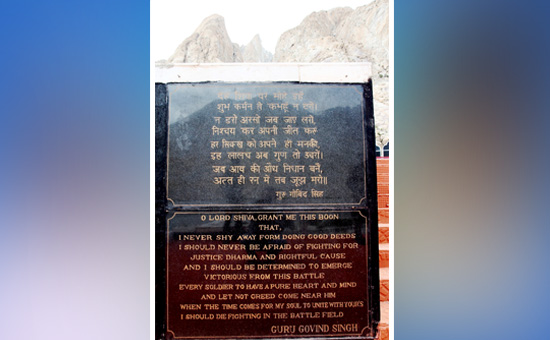 Guru Govind Singhji prayer to Lord Shiva. Siachen War Memorial 2016.
Guru Govind Singhji prayer to Lord Shiva. Siachen War Memorial 2016.
Suggestions
follow i.e. from 26 to 35.
26. Should there not be a
uniform minimum age for girls to get married?
Marriage age for all Indian women should
be 18.
Read Ideal marriage
age according to Neuroscience and Women’s Marriage Age matters for public health And Can an underage
girl marry on reaching puberty
27. Registration of
Marriage and Divorce?
It is proposed that all marriages be
registered with the state government and a central government portal (the
second part shall apply only to converted tribes of north east and not tribes
in rest of India). Divorce can be confirmed by a civil and not any religious
court or Church.
If marriages are registered it will make
compliance easier and help women.
28. How should the UCC
cover Inter-faith marriages?
Inter-faith marriages should have appropriate
laws to support them. So what is proposed?
An interfaith marriage is one between a
girl/boy from an Indic Faith to a Christian or Muslim. All such marriages
should be under the Special Marriages Act. Currently,
conversion between followers of Indic faiths is not a pre-requisite for
marriage hence this proposal.
This way there is no need to convert, a
cause of social tension. Divorce can be obtained under the
provisions of Section 13 of the Hindu Marriage Act, 1955 the provisions are
equal for both husband and wife. A petition for divorce can be filed by either
of the Spouse under section 27 of the Special Marriage Act, 1954 or a Petition
for divorce by mutual consent under section 28 of the Act.
The UCC must provide that in case of inter-faith marriages, if the husband passes way the wife shall have an equal share of the husband’s property along with her children, plus be entitled to her individual properties.
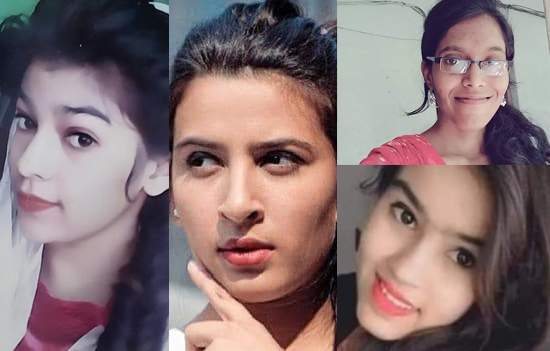
29. If a person
misrepresents their religion to get married?
When usually a man (to include women
too) misrepresents or lies about their religion to make the other person say
lady agree to his marriage proposal, it is proposed that lady can in future
(within say five years of marriage) file a criminal case for misrepresentation
against the man for which punishment is say ten years of imprisonment.
Read Crime
against Hindu women involving love and marriage
30. Divorce
“The grounds and procedure for divorce should be specifically laid down. The grounds enumerated in the code should be reasonable and the procedure prescribed should be according to the principles of natural justice.”
Divorce is valid when
confirmed by a Court. Religious bodies including Church have no role.
31. Maintenance
In case of divorce, the basis for the amount
to be paid to former wife as maintenance should be the same for all Indians.
Since in many cases, women in urban
India earn more than men the reverse should be provided for.
32. Inheritance Rights to
be the same for all adopted children!
A legally adopted child must have the
same rights to inheritance of property as a biological child.
Read Comparison of Hindu and Muslim laws of succession – good read
33. Tax Laws should be same for all religions
What is the law now?
According to section 10 (26) of the Income-Tax Act (excerpts), "A member of a Scheduled Tribe, as defined under clause 25 of article 366 of the Constitution, who resides in the States of Arunachal Pradesh, Manipur, Mizoram, Nagaland and Tripura is exempt from paying income-tax on any income which accrues or arises to him in these States".
Why
should a tribal who has converted to Christianity be considered ST for tax
purposes? After seeing the people of Nagaland at Hornbill Festival, visiting
Mizoram and Bastar, those from the northeast are anything but tribal.
In Manipur
the Meitie community (Hindus) are liable to pay income-tax whilst Scheduled
Tribes who converted to Christianity are not.
In Tripura,
the former rulers are considered ST. Ace music director, the late R D Burman
was ST.
Read Tax laws should be the same for
all Indian citizens and Who are Scheduled Tribes
34. Lot of noise about
Hindus getting tax breaks through HUF?
What is HUF?
A HUF is a separate entity (person under section 2 (31) the Income-Tax Act). “Under Hindu Law an HUF is a family which consists of all persons lineally descended from a common ancestor and includes their wives and unmarried daughters.” For this purpose Hindus means Hindus, Buddhists, Jains and Sikhs.
Once recognised HUF gets a separate Permanent
Account Number and is taxed separately. If structured sensibly HUF can become
an efficient tax planning tool.
This needs to go. If required in a
phased way so assesses have time to plan and effect the change.
35. Should India have a “Uniform Law for Trust and Trustees, Charities and Charitable
Institutions, and Religious Endowments and Institutions? Instead of the Waqf
Board as separate from the Charity Commissioner?
Is the concept of Waqf property being dedicated to
The Almighty appropriate in a Constitution driven state? Properties are managed
by Waqf (equivalent of a Trust) and State Waqf Boards. According to
section 14, members of the State Waqf Board must be Muslims be it a MP, MLA, Member
of the Bar Council, Expert in Town Planning or Management, scholar in Islamic
Theology. So also the CEO must be a Muslim.
Should the Waqf Board be conferred
with the jurisdiction to decide the question of title of the property
possessed by Followers of Dharma?
Read All you want to
know about Waqf Board
It is possible some of the issues referred to above also falls within the domain of the states. India must be governed by one law, the centrally passed UCC.
36. In Parsis, the children of Parsi woman married to a non-Parsi are not accepted as Parsis. This does not apply to Parsi men.
Senior Advocate Percival Billimoria says, “Please be mindful that the religion is Zoroastrianism while “parsi” is a race. The word was attributed to people who came to India from Iran and includes their descendants, but not children of Parsi women who are married to non-Parsis.
This has several implications, including inheritance. It is also unconstitutional since (a) a woman has the right to marry whoever she wants without having to deal with any consequences (b) the same issues do not affect Parsi men who marry non-Parsi women and is therefore contrary to the constitutional principle of no discrimination on grounds of gender.
More importantly, it is not even Parsi law or religious law. It is based on a 1908 judgment of the Bombay High Court which suit itself was not maintainable. The problem is that after this decision, there is now a dual test which is laid down – someone must be a “Parsi Zoroastrian” which means a Zoroastrian by religion and a Parsi by race. The latter was defined by the Court to mean lineal descendants of people who came from Iran but not those born of non-Parsi women. This criteria is used to determine even inheritance rights in some cases where the society of the building mandates that the property is for use only by Parsis.”
Conclusion
Hope the government defines Secularism as ‘equal respect for all religions’ and gives Hindu the right to manage their places of worship.
Religious Laws invariably have a
pre-defined set of rules that are fixed. However, society and the world are
changing. So we need laws that keep pace.
India is a democratic republic that
allows its citizens freedom to practice religion. But religious practices that
are devoid of fair treatment of women cannot be continued in the name of
freedom of religion and secularism. People and laws have to change with time.
The UCC shall only comply with Article
44 of the Constitution.
Nations are built through amalgamation
of identities not by continuously harping on differences.
If the government develops cold feet on
UCC, it can pass an Equal Rights for Women Act whereby all laws which do not
give equal rights to Indian women shall stand repealed. This is the concept.
Some will never agree to a UCC, however
conducive the environment. So when enacted,
the government should communicate in one voice and clearly or else mischief and
rumour mongers will have a field day.
Errors, if any, are without malafide
intent. In case of error, mail me details-will review and correct. Read,
reflect and decide for yourself is thy approach.
This FAQ should not be republished
without written permission of www.esamskriti.com.
All pictures by author.
References
1. Paper – Muslim Law of Inheritance by Smt Sk. Shireen. To read click on PDF
2. Comparison of Hindu and Muslim laws of succession – good read
Also read Ashraafisation
of Islam, Give Pasmandas a seat on the table